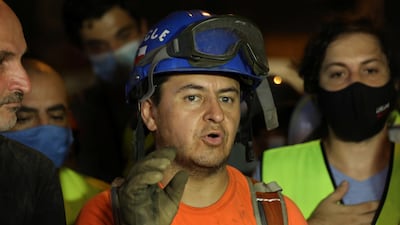A Chilean rescue team said on Saturday evening that there was no one alive in a collapsed building in Beirut after three days of search that had Lebanon on tenterhooks.
A much-needed piece of good news failed to eventuate 32 days after the deadly blast that killed nearly 200 people and wounded 6,500.
"There are no signs of life," said Francisco Lermanta, head of volunteer rescue group Topos Chile.
Mr Lermanta said rescuers had combed 95 per cent of the building.
He said the signs of life detected in the past two days were the breath of fellow rescuers already inside the building.
Efforts will now focus on clearing the rubble and finding remains.
“We will continue with the protocols so that we can dismiss the presence of a body inside the building,” Mr Lermanta said.
“We checked 95 per cent of the building and the only part missing is the pavement, which is full of rubble.
"We never stop with even 1 per cent of hope. We never stop until the job is done."
Flash, Topos Chile’s rescue dog, detected signs of life on Wednesday evening in the collapsed building in the Gemmayze neighbourhood.
The border collie, who was slightly injured on Saturday morning during the search, immediately became a national hero in Lebanon.
Hopes for a miracle surged more than a month after the explosion of 2,750 tonnes of ammonium nitrate at Beirut’s port.
"We are attached to this small glimmer of hope. We all need to believe that better days are before us," Oscar-nominated director Nadine Labaki told The National on Friday.
Like dozens of volunteers, journalists and bystanders, Labaki was at the site since Thursday.
Months before the blast, Lebanon was suffering from its worst-ever economic crisis that was compounded by the coronavirus pandemic.
Half of the population lives under the poverty line, banks have limited access to cash and the local currency has lost about 80 per cent of its value on the black market.
The August 4 explosion hit some of the liveliest neighbourhoods and made 300,000 people homeless.
The Chilean rescue team conducted tests in the collapsed building and said they believed a small person, possibly a child, was still alive, while a larger person was dead.
But hopes started to fade on Saturday after three days of search and no signs of life.
Two female members of the team went into a tunnel in the afternoon to check the last spot where survivors could have been but there was nobody inside, Mr Lermanta said.
As they worked, the army pushed people away from the site, fearing that the crumbling building would collapse.
Mr Lermanta dismissed rumours that the Lebanese army had hindered the work of the Chilean team, which was supported by the Lebanese civil defence and local charity Live Love Lebanon.
“We are co-operating with government institutions, NGOs, and companies,” he said.
Lt Michel El Murr of the Beirut fire department told The National that members of his team, who were also working on the building, were asked by the Chilean team to leave on Friday afternoon because they disagreed on how to conduct the search.
Activist Melissa Fathallah, who helped to co-ordinate the rescue effort, told The National that she did not feel defeated despite the bad news.
“If someone’s alive, that’s great. If we find a body, we can at least bury it,” Fathallah said. “And if not, the building was dangerous anyway, and we can do something about that.”














